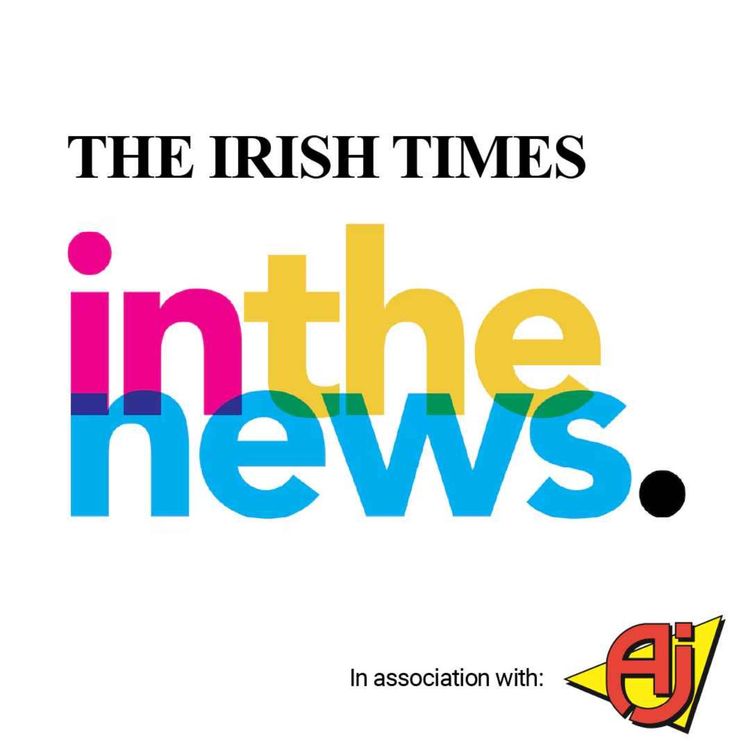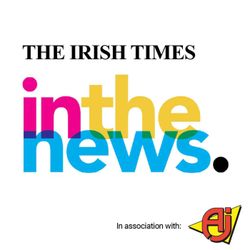Share

In The News
Why are western countries cutting funding to Gaza's biggest aid agency?
•
Last week, Israeli authorities alleged that some employees of UNRWA, the Relief Works Agency for Palestine Refugees, were involved in the October 7th Hamas attacks.
In response, several countries pulled their funding for the UN agency, jeopardising the delivery of vital humanitarian aid to the desperate citizens of Gaza.
UNRWA, which was founded in 1949 and employs more than 30,000 people, works with Palestinian refugees in Gaza, the West Bank and other Middle Eastern countries such as Lebanon and Syria. So what will be the impact of these financial cuts for Palestinians on the ground?
Mark Weiss in Jerusalem talks to Sorcha Pollak about UNWRA, hostage negotiations and the risk of a wider war.
Produced by Suzanne Brennan and Declan Conlon.
More episodes
View all episodes

How the fatal ICE shooting has deepened divisions in the US
21:56|The killing of Renee Nicole Good (37) in her car on the streets of Minneapolis by an immigration officer has been witnessed by millions of people around the world.Countless bystanders took videos on their phones from all angles on the snowy suburban street as the mother and US citizen drove by, was surrounded by armed Ice (Immigration and Customs Enforcement) agents and was shot dead.So it should be possible to quickly reach a definitive conclusion as to what happened.But as Rachel Leingang, Midwest political correspondent for Guardian US, explains the killing instantly became politicised in a city where tensions were already on a knife-edge, with armed Ice officers swarming neighbourhoods as part of the Trump administration immigration crackdown.Presented by Bernice Harrison. Produced by Suzanne Brennan.
Trump wants Greenland - what’s to stop him taking it?
24:30|On Sunday US president Donald Trump said he needed Greenland “very badly”. It’s a sentiment he expressed during his first term, but what then sounded like something of a fantasy wishlist has now hardened into policy.Reaction to Trump’s intentions has taken on some urgency following his removal by military force of Venezuela’s president, Nicolás Maduro, last weekend,Quite how he might move to take over the vast Arctic territory is unclear.This week the White House said the use of the US military is “always an option”; it also said it might seek to buy the island from Denmark.Greenland is part of the Danish kingdom. Mette Frederiksen, the Danish prime minister, has said an attack by the US on a Nato ally – Greenland as part of Denmark – would mean the end of the alliance.But in a week that saw the Trump administration doubling down on its intention to take over the mineral rich island, the EU is scrabbling to respond to the threats from Washington in a way Trump might take seriously, as Brussels-based Irish Times reporter Jack Power explains.Presented by Bernice Harrison. Produced by Suzanne Brennan.
Ken Early on why Ruben Amorim and Manchester United were a disastrous match
27:40|Since he took over as head coach at Manchester United Ruben Amorim has been outspoken, dishing up post-match commentary that frequently centred on how poor he felt his players had performed.On January 4th, after a desultory 1-1 draw with Leeds, he took aim, not at his players but at United’s top brass – his bosses. He was, he said, the manager, not the coach; the heavy implication being that he wanted to make his own decisions and that management were getting in his way.On Monday it was announced that Amorim would be leaving the club with immediate effect.Once again Manchester United is on the hunt for a manager – or to be more accurate in the modern game – a coach.Irish Times columnist Ken Early explains why Amorim was never a good fit for United and why coaches at top-flight clubs have an increasingly short sell-by date.Presented by Bernice Harrison. Produced by John Casey.
Trump says 'we run Venezuela'. Is that true?
24:01|On Monday, captured Venezuelan President Nicolás Maduro and his wife Cilia Flores appeared in a court in New York City on charges including drug-terrorism conspiracy, cocaine-importation conspiracy, and possession of machine guns and destructive devices. The pair pleaded not guilty to all charges, with Maduro telling the court, “I’m innocent. I am not guilty … I am a decent man. I am still president of my country”. But if Maduro is in New York, who is in charge in Venezuela? US President Donald Trump says, “we are” – but what does that really mean? In today’s episode, Tom Hennigan who reports on South America for The Irish Times explains what Maduro’s arrest means for the country and its people. Presented by Declan Conlon, produced by Suzanne Brennan.
Hyrox: Should you try this fitness fad to get fit after Christmas?
24:15|When Hyrox came to Dublin’s RDS last November, it was a completely sold out event. The tickets for the fitness race were snapped up in minutes of going on sale, with organisers adding extra dates just to meet demand. But one person who was able to get their hands on a ticket was Irish Times sports writer Gordon Manning. The only problem? He'd never tried Hyrox before and hadn’t done any training for the event. Manning - who isn’t even a member of a gym - decided to take on the gruelling challenge to find out why this fitness craze has become so popular in Ireland and around the world. But with so little preparation, did he survive the race? And what does it involve anyway? In today’s episode, we’ll hear all about Manning's Hyrox experience, whether he’d do it again and whether you should do it too.Presented by Bernice Harrison, produced by Suzanne Brennan.
How the race for total AI domination is revisiting the worst of human history
23:50|This episode was first published in August.In the space of a few short years, generative AI has exploded into our daily lives, impacting the way we learn, work and understand the world around us.Open AI, the American artificial intelligence company cofounded by Sam Altman and Elon Musk in 2015 which runs ChatGPT, claims its non-profit “mission” is to ensure these systems “benefit all of humanity”.And while the launch of ChatGPT has undoubtedly lightened the workload of many, engineer, journalist and AI expert Karen Hao says the AI race for world domination carries a huge human and environmental cost.In 2019, Hao spent three days embedded in the offices of OpenAI and discovered this company, which claims to be transparent and operating “for the good of humanity”, was in fact highly secretive.In her bestselling book ‘Empire of AI: Inside the reckless race for total domination’, Hao warns that the world has entered a new and ominous age of empire, where a small handful of companies are writing the future of humanity.Today, on the In The News podcast, how the race for total AI domination is repeating the worst of human history.Karen Hao discusses the severe cost of the seemingly unstoppable growth of OpenAI.Presented by Sorcha Pollak. Produced by Aideen Finnegan.
‘My Irish friends are awesome’ says Elon Musk – who are they?
27:07|Elon Musk seems particularly taken with the opinions of three Irish men active on X: far-right activist Michael O’Keeffe; Barry O’Driscoll, whose idea of calling the US’s new cost-cutting agency DOGE was seized on by president Donald Trump’s right-hand man, and Keith O’Brien, a white nationalist who goes by the name Keith Woods on X. Musk interacts with these men and often amplifies their posts to his millions of followers. So what image of Ireland is the billionaire being fed by these men and why does it matter that so much of what he sees, and endorses from his “awesome” Irish friends, is often simply factually wrong? Crime and security editor Conor Gallagher profiles the men, including the Cork-based O'Driscoll who goes by 'Sir Doge of the Coin' on X, and explains what happened when he wrote about them in The Irish Times.Presented by Bernice Harrison. Produced by Aideen Finnegan.
Petrol bombs and drive-bys: How Limerick’s gangland violence returned
26:08|This episode was first published in June 2025. In the early hours of May 8th, two masked men in a stolen Audi staged a drive-by shooting, firing nine shots indiscriminately at houses on Limerick’s Hyde Road, including at April Collins’s home. More shots were fired at a Collins-owned home on the Hyde Road in November 2024, and in two separate attacks in January 2025. Since then, there have been a dozen violent incidents, including pipe and petrol bomb attacks.The Garda Emergency Response Unit now conducts nightly armed checkpoints in flashpoint areas. The gangs appear undeterred.Between February and April, the Cork-based bomb disposal unit was deployed on multiple occasions to deal with pipe bombs seized in Limerick’s criminal strongholds.In 2012 there was hope that the violent territorial feud between the city’s key drug suppliers, the McCarthy-Dundon gang and the Keane-Collopy gang had been calmed, particularly with the jailing of key members of the Dundon family. April Collins’s evidence sealed the case for the State. She moved away from Hyde Road following the court case but in late 2023 she moved back and tit-for-tat attacks ensued.And what of the new generation street criminals? Some are so young they were not even born when the original feud was in at its peak, but their actions show those gang lines that were drawn still exist: that the feud has never gone away.Brian Carroll tells In the News about the resurgence in drug-related gang violence in Limerick.Presented by Bernice Harrison. Produced by Declan Conlon and Suzanne Brennan.
Richard Satchwell: why did it take eight years for the killer to face justice?
31:18|This episode was first published in May 2025. From the moment he reported her missing in 2017, Richard Satchwell stuck to his story that his wife Tina had run off.His many media appeals begged her to come home. But as the jury heard during his five-week trial in the Central Criminal Court for her murder, she was indeed home and she had been all along.Richard had killed her in 2017, dug a hole under the stairs of their terraced Youghal home and buried her.The Garda did look for her – as a missing person – but “red flags” emerged soon after her disappearance were “simply ignored” by gardaí, the court was told.What were they? And why did it take until six years after her disappearance for a thorough search of the Satchwell house to take place?Irish Times legal affairs correspondent Mary Carolan tells In the News how the court case unfolded and what happens next.Presented by Bernice Harrison. Produced by Declan Conlon and John Casey.